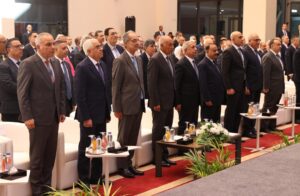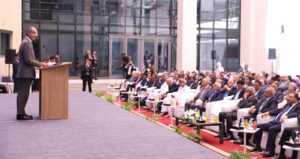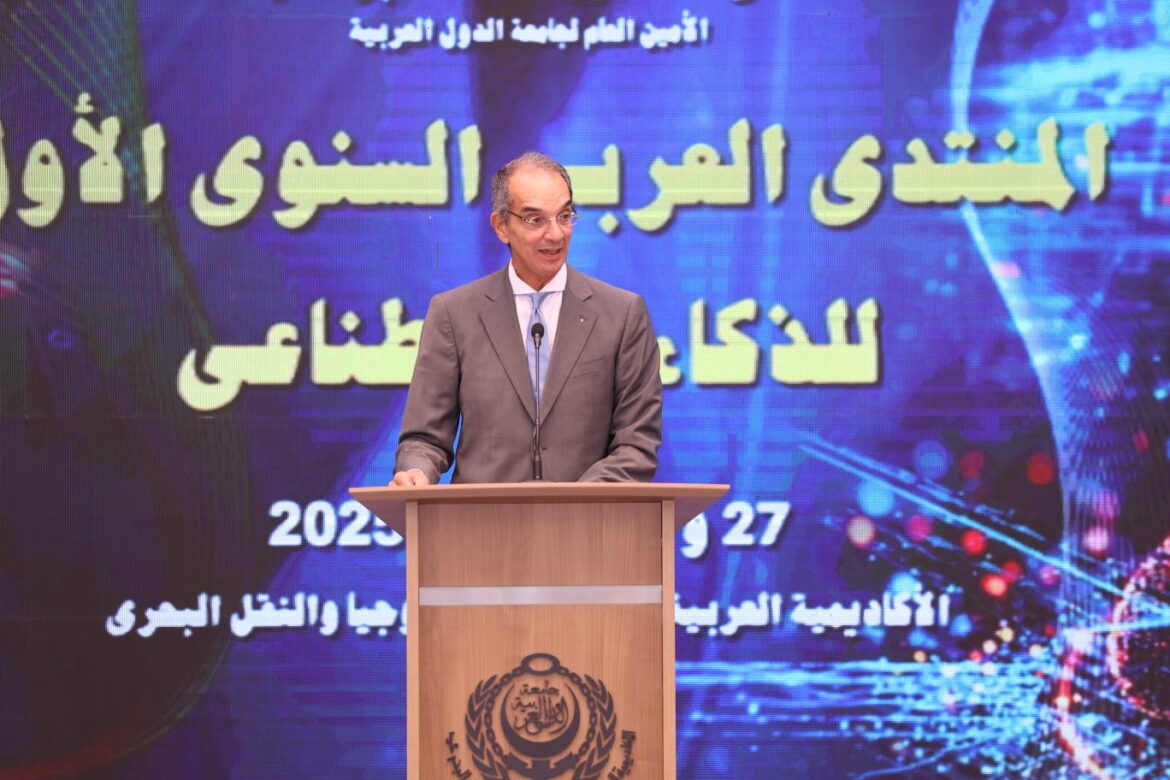The Minister of Communications and Information Technology Amr Talaat has participated in the First Arab Forum on Artificial Intelligence, organized by the Arab Academy for Science, Technology and Maritime Transport (AASTMT) in cooperation with the General Secretariat of the League of Arab States (LAS), over two days in New Alamein City.
The forum was held under the patronage and in the presence of Secretary-General of LAS Ahmed Aboul Gheit, with the aim of advancing Arab cooperation in AI and exchanging expertise and insights on the latest developments and challenges in this vital field.

The opening session was attended by Minister of Education Mohamed Abdel Latif, Chairman of the Board of Trustees of the Egyptian Money Laundering and Terrorist Financing Combating Unit (EMLCU) Ahmed Saeed Khalil, and President of AASTMT Ismail Abdel Ghafar.
During his speech, the ICT Minister affirmed that joint Arab cooperation in the field of artificial intelligence is no longer a luxury but a pressing necessity.
He underlined the importance of strengthening Arab cooperation in this domain through an institutional framework, adding that Egypt has proposed the establishment of a council of Arab ministers for AI and emerging technologies under the umbrella of LAS, to serve as a high-level platform for unifying efforts, coordinating policies, and enhancing the Arab presence on the international AI landscape.

Talaat stressed that the First Arab Forum on AI constitutes a comprehensive Arab gathering contributing to enriching discussions on AI developments, grounded in science and aligned with the shared priorities of Arab states.
He extended congratulations, in Egypt’s capacity as Chair of the 28th session of the Arab Telecommunications and Information Council of Ministers (ATICM) and of the Executive Bureau, to the Secretary-General on the “Arab AI Initiative: Towards Technological Leadership and Sustainable Development,” launched following the summit in Iraq last May. He emphasized that this initiative represents a guiding framework for joint Arab action and a strategic foundation to consolidate Arab digital integration.
Talaat remarked that the General Secretariat’s adoption of this file at the highest level reflects a profound awareness that AI technologies have become a cornerstone of the Arab digital economy, a driver for the development of the region’s various sectors, and a bridge toward a more competitive knowledge economy and a more inclusive and equitable society.
The ICT Minister noted that at the beginning of this year, ATICM issued the Arab AI Strategy and adopted the Arab Charter for AI Ethics, to ensure that the development of this technology in the Arab region is guided by noble values, innovation with responsibility, and sound governance. This, he said, is key to advancing the adoption of AI in a way that promotes comprehensive development and harnesses these technologies to serve humanity and improve well-being without excluding any segment of society.
Talaat further explained that AI has become a global race among major powers and leading technology companies developing generative and agentic AI models, as well as AI chips and processors. He highlighted the importance of maximizing the benefits of AI while being mindful of associated risks, mitigating their impacts, and preparing for them.
The ICT Minister stressed that governments and societies must respond proactively to the rapid effects of AI advancements on labor markets by adopting forward-looking policies that prepare specialists across sectors to keep pace with change. He underlined that the accelerating developments leave the Arab region with no option but to act collectively with an integrated vision and a unified voice.
Talaat noted that Egypt is moving forward with the Second Edition of its National AI Strategy, aiming to translate technological capabilities into tangible developmental impact across key sectors. He added that last month, two AI-based systems were launched. The first was in the justice sector, through the remote litigation system in criminal courts, supported by a speech-to-text system that automatically produces court records using AI, achieving world-class accuracy in processing spoken Arabic in the Egyptian dialect. This system was developed by Egyptian engineers at the Applied Innovation Center (AIC) of the Ministry of Communications and Information Technology (MCIT).
The second system was in the healthcare sector, with the launch of the first entirely Egyptian system for early detection of women’s tumors using AI—the first of its kind in the region—developed with an accuracy rate of 90%, the highest globally in this field. Developed entirely by Egyptian experts, the project aimed to create a high-accuracy system tailored to Egyptian genetic characteristics. The ICT Minister affirmed Egypt’s readiness to cooperate with all Arab countries to extend the benefits of these systems across the Arab world.
Talaat also explained that Egypt is working on producing systems in education, agriculture, and irrigation to strengthen the management of the education system, manage water resources through smart systems, and improve agricultural production planning. He pointed out that Egypt’s selection to host the first edition of AI Everything Middle East and Africa in February reflects the country’s influential role in developing AI applications that serve various sectors and generate tangible developmental outcomes in citizens’ daily lives. He invited broad participation in the summit to open new horizons for cooperation between Egypt’s ICT sector and its Arab counterparts.
The ICT Minister concluded his speech by affirming that the integration of Arab efforts is the optimal path to safeguard common Arab interests and enhance negotiating presence in international fora. He extended sincere appreciation to all who contributed to organizing the forum, expressing confidence that Arab cooperation will remain a source of strength, enabling Arab countries to achieve a level of digital leadership worthy of their peoples in the era of artificial intelligence.


